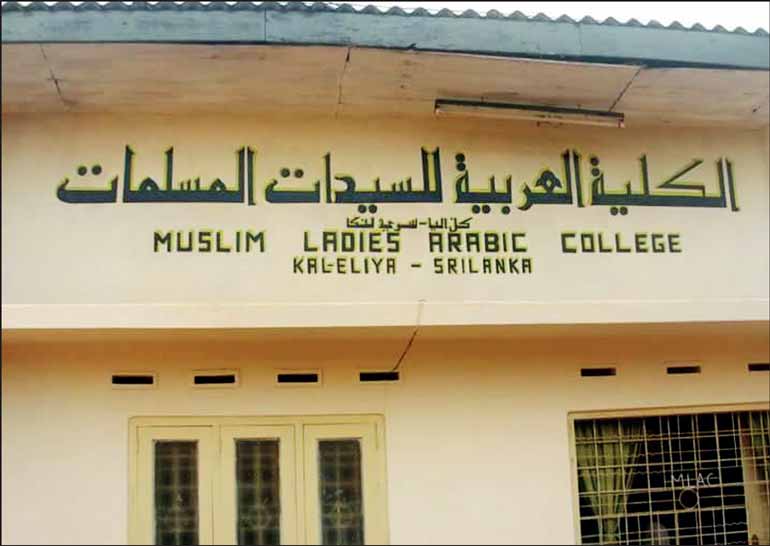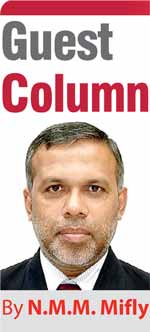Saturday Feb 21, 2026
Saturday Feb 21, 2026
Friday, 9 May 2025 00:00 - - {{hitsCtrl.values.hits}}

The Wakf Board’s decision to register the Muslim Ladies Arabic College under the Wakf Act as a Muslim charitable trust is a landmark step
 In a historic move that signals a new era of accountability and reform in Muslim charitable institutions, the Wakf Board—a statutory body established under the Wakf Act, No. 51 of 1956 (as amended)—issued a landmark order on 30 April 2025. Following extensive deliberations on oral and written submissions from all parties involved, the Board ruled that the 65-year-old pioneer institution, Muslim Ladies Arabic College of Kal-eliya (MLAC), must be formally registered and governed under the provisions of the Wakf Act.
In a historic move that signals a new era of accountability and reform in Muslim charitable institutions, the Wakf Board—a statutory body established under the Wakf Act, No. 51 of 1956 (as amended)—issued a landmark order on 30 April 2025. Following extensive deliberations on oral and written submissions from all parties involved, the Board ruled that the 65-year-old pioneer institution, Muslim Ladies Arabic College of Kal-eliya (MLAC), must be formally registered and governed under the provisions of the Wakf Act.
The Wakf Act, enacted by Parliament, provides a legal framework for the registration and oversight of Muslim religious sites and charitable trusts (Wakfs) created for purposes expressly stated in Section 32(1) of the Wakf Act.
What is a Wakf?
A Wakf is a form of Islamic charitable endowment in which a Muslim irrevocably dedicates an asset—such as land, a building, or money—for public benefit, solely seeking the pleasure of Allah. The key features of a Wakf include:
Permanent dedication: Once an asset is declared a Wakf, it can no longer be sold, inherited, or transferred. It remains perpetually tied to its charitable purpose.
Benefit to the Muslim public: Wakfs are primarily (not exclusively) intended to serve the Muslim community—supporting institutions like mosques, schools, water facilities, or roads.
Spiritual intent: The founder expects no material return, dedicating the asset purely for spiritual reward.
Background of the case: MLAC
The Muslim Ladies Arabic College of Kal-eliya (MLAC) was established in 1959 by five Muslim philanthropists in Kal-eliya, a predominantly Muslim village in the Mirigama AGA Division of the Gampaha District, Western Province. The founders had three primary objectives:
To promote the study of Arabic and Islamic studies, particularly among Muslim girls in Sri Lanka;
To manage and maintain the Darul Aitham (Muslim Orphan Girls Home) and Darul Athfal (Children’s Home) located within MLAC premises;
To undertake any other activities incidental or conducive to achieving these goals.
MLAC began modestly, with 27 part-time, non-residential students who attended the nearby Kal-eliya Government School in the morning and received Arabic and Islamic education at MLAC in the evenings. The College was built on a two-acre plot of land donated by one of the founders. Entire Muslim community is indebted to them for the noble and eternal charity they had created for the benefit of the community and humanity.
In a public appeal dated 23 July 1961, all the founders jointly appealed to the Muslim community for additional donations to construct buildings on the land donated by one of the founders referring it explicitly as “Wakf land” valued at Rs. 10,000.
According to available records, the initial endowment of Rs. 10,000 was the sole material contribution from the founders. All subsequent assets—including college buildings and various income-generating properties across the country, now worth several hundreds of millions—were funded through donations from local and foreign benefactors inspired by MLAC’s mission.
Recognition as an approved charity
 Owing to the overwhelming public support, MLAC was officially recognised as an “Approved Charity” via Gazette Notification No. 13998, dated 28 March 1964.
Owing to the overwhelming public support, MLAC was officially recognised as an “Approved Charity” via Gazette Notification No. 13998, dated 28 March 1964.
An Approved Charity means any public charitable trust or institution that has been formally declared as such by the Minister, as per Section 1(a) of the Fifth Schedule of the Inland Revenue Act, No. 24 of 2017. Donations made in money to such institutions qualify as deductible payments from the donor’s assessable income and the income generated by it is taxed at a lower tax rate.
MLAC: Muslim public charity or private property
The Muslim Ladies Arabic College Managing Society, Kal-Eliya (MLAC)—established through the generous contributions of local and international donors—was formally incorporated by Parliament under Act, No. 46 of 1991 (the MLAC Act). This incorporation was part of a dispute resolution initiative supported by several respected well-wishers and legal experts.
The MLAC Act, together with its accompanying Rules, was designed to ensure good governance through democratic oversight. According to Paragraph 04 of the Rules, a “Society” of subscribing Muslim males over the age of 21 was to be constituted. Paragraph 09 requires that an Annual General Meeting (AGM) be held, where audited accounts must be presented and the office-bearers of Board of Management elected every three years.
However, for over 30 years, these rules have been ignored. No AGMs were held, and the Society never functioned. Board members effectively held lifelong positions, with control centralised in a single founder’s family—excluding the descendants of other founders.
The author of the article resigned from the Board and as its secretary in September 2020 after repeated, unsuccessful reform attempts. The Board neither accepted nor acknowledged this resignation; instead, the late Board President submitted an affidavit in 2021 asserting the author was still secretary. The situation worsened with the addition of two more family members to the Board in 2021 and 2022, sparking public concern over governance and the marginalisation of stakeholders of the students, teachers, parents, old girls, well-wishers, villagers and reformist Board members.
The Board further alienated the community by treating MLAC as private property and prompting the Examination Department to revoke fee exemptions previously granted to MLAC students. Attempts at reconciliation involving leading organisations like ACJU and NSC failed, leading stakeholders to pursue legal action to restore the legitimacy of the Board of Management and MLAC’s status as a Muslim charitable trust via court of law and Wakf Board.
Following an extensive review, the Director of the department of Muslim Religious Affairs recommended MLAC’s registration as Wakf property under Section 32 of the Wakf Act. On April 30, 2025, the Wakf Board officially declared MLAC to be a Muslim Charitable Trust, affirming its registration under the Act in a landmark decision.
The following is the part of the determination of the Wakf Board on the necessity and eligibility of MLAC for its registration under the Wakf Act.
“The College’s operational framework demonstrates clear alignment with these statutory criteria, particularly through its primary mission of advancing Muslim girls’ education, existing registration as a charitable entity and reliance on religious funding mechanisms including Zakat.”
“The Wakfs Act explicitly encompasses institutions established for: (i) the advancement of education for Muslims; (ii) any purpose beneficial to the Muslim community; and (iii) any other objective recognised under Muslim law as religiously meritorious. The Board’s comprehensive review of the Arabic College’s founding objectives, operational framework, property holdings, and funding sources, including both domestic and international charitable contributions, conclusively demonstrates its perfect alignment with the Wakf Act’s stipulated criteria.”
“The institution’s core mission of promoting educational opportunities for Muslim girls constitutes an example of the charitable purposes contemplated by the Wakfs Act. This alignment is further corroborated by the College’s existing registration as a charitable organisation with relevant government authorities. The dual recognition both functionally through its educational activities and formally through its legal status - creates an irrefutable case for eligibility.”
“Having meticulously examined all pertinent facts and evidence, the Board determines that the Arabic College incontrovertibly qualifies for registration as a trust under the Wakfs Act’s provisions. The institution satisfies every substantive requirement established by the legislation, and no legitimate impediment to registration exists.”
“The Board has conclusively established that the institution falls within the jurisdictional authority of the Wakfs Board for registration purposes. As established under the Muslim Mosques and Charitable Trusts or Wakfs Act of 1956, the Wakfs Board serves as the statutory governing body responsible for overseeing Muslim charitable trusts and the Mosques in Sri Lanka”.
Why is the Wakf Board’s order historic?
The recent order issued by the Wakf Board is indeed historic. It marks an important moment in restoring transparency, accountability, and inclusivity to a Muslim charitable trust that has long operated outside the purview of both religious and civil legal frameworks. This order holds particular significance in an era when many Muslim charitable properties—established with noble intentions by our forefathers—are being misused or diverted from their original purposes, often by their own descendants.
Many such charitable institutions may not have been registered under the Wakf Act due to justifiable reasons, including certain deficiencies in the Act itself or excessive trust placed in one’s heirs. It is widely acknowledged that the Wakf Act, enacted in 1956, is imperfect and in need of urgent reforms. Nonetheless, the benefits of registering a Muslim charitable trust under the Wakf Act far outweigh its disadvantages.
Recent developments, such as the challenges faced by more than 90-year-old Gafooriya Arabic College due to its non-registration, have highlighted the vulnerabilities of unregistered institutions. If a Muslim charitable institution was developed solely through the personal donations of its founder, the legal (though not necessarily moral) responsibility of its administration might rest solely with the founder’s heirs.
However, the reality is that most of these institutions have grown and succeeded through the moral, financial, and intellectual support of the broader Muslim community. Therefore, no individual or family can justifiably claim sole ownership or prevent statutory oversight by the Wakf Board.
In this light, the Wakf Board’s decision to register the Muslim Ladies Arabic College under the Wakf Act as a Muslim Charitable Trust is a landmark step. Despite challenges to the current management’s legality, it is hoped that they will recognise and welcome this move, acknowledging the Board’s role in safeguarding the institution’s long-term mission. This registration will help ensure that MLAC’s governance remains transparent, accountable, and aligned with its founding spiritual and charitable values.
More broadly, this order sets a vital precedent. It opens the door for other longstanding but informally governed Muslim charities to come under the protective umbrella of statutory oversight, thereby enhancing public trust and donor confidence. Today, numerous Muslim charitable institutions, both existing and emerging, have been created by generous philanthropists for the betterment of the Muslim community and humanity at large. Yet, many remain unregistered under the Wakf Act.
It is, therefore, not only prudent but also a moral imperative for current stakeholders—administrators, trustees, and community leaders—to bring them under the proper registration of the Wakf Act. Failure to do so would not only invite future regret but may also render them accountable for neglecting this crucial responsibility.
Moving forward, it is the solemn duty of community leaders, intellectuals, and civil society organisations to critically examine and advocate for necessary reforms in Acts specifically enacted by Parliament for Muslims such as the Wakf Act and the MMDA. Strengthening these legal instruments will better protect the charitable assets entrusted to the community and ensure they fulfil their noble objectives.
The Muslim community owes a deep debt of gratitude to the Honourable Chairman and esteemed members of the Wakf Board for their visionary leadership. Their timely and courageous order reaffirms a collective commitment to safeguarding Muslim charitable institutions and preserving the sacred legacy of selfless giving for generations to come.
Let this be a turning point—one that inspires broader reform, renewed accountability, and a reawakening of our shared responsibility to uphold the trust of our ancestors and serve the greater good.
(The writer is a retired Deputy Commissioner General, Inland Revenue Department. He can be reached at [email protected].)